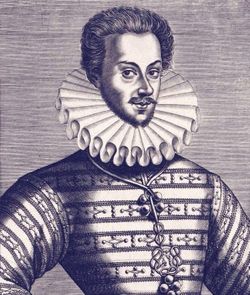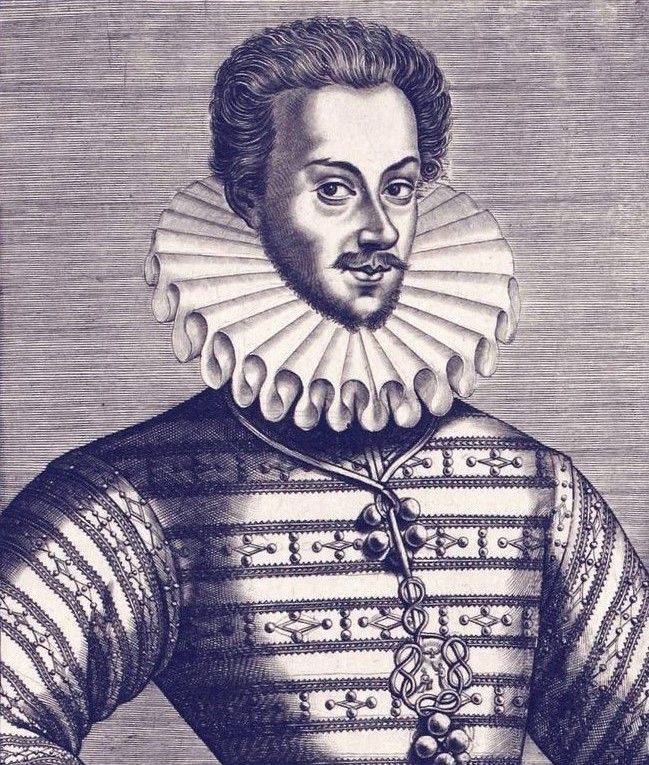Charles Emmanuel was duke at a volatile time, and subsequently was involved in many political intrigues, mostly by his relationship on his mother's side with the House of Guise. The Duke of Guise was one of the leaders of the Catholic League opposing the Huguenots, and Charles Emmanuel sympathised with their cause. However, after the assassination of Henry I, Duke of Guise and his brother the Cardinal of Guise, Charles Emmanuel was imprisoned by the Huguenots in 1588, but was able to escape. He was to fight the Huguenot forces for some years; he fought at the Battle of Arques in 1589. That same year, Charles Emmanuel was the governor of Paris, as the Huguenot forces, led by Henry of Navarre besieged Paris. During the siege, King Henry III of France perished, and Henry of Navarre soon declared himself King Henry IV of France. Charles Emmanuel escaped, and fought the newly proclaimed King at the Ivry in 1590, which was a decisive loss for the Catholic League. The same year he commanded Catholic forces during the Siege of Paris, successfully defending the city.
After the defeat, Charles Emmanuel strongly disagreed with his half-brother and long-time ally Charles of Lorraine, Duke of Mayenne (also of the House of Guise), who advocated conciliation with Henry IV. Charles Emmanuel withdrew to his government in Lyonnais, where he endeavoured to make himself independent from the French crown. He was imprisoned, however, in the chateau of Pierre-Encise by the archbishop of Lyon. Again, he successfully escaped, and decided to attack Lyon. The intervention of the Constable de Montmorency thwarted his attack however, and his attempt at independence failed.
He died at Annecy in 1595, leaving the Duchy of Nemour to his brother Henri de Savoie.
Charles Emmanuel was duke at a volatile time, and subsequently was involved in many political intrigues, mostly by his relationship on his mother's side with the House of Guise. The Duke of Guise was one of the leaders of the Catholic League opposing the Huguenots, and Charles Emmanuel sympathised with their cause. However, after the assassination of Henry I, Duke of Guise and his brother the Cardinal of Guise, Charles Emmanuel was imprisoned by the Huguenots in 1588, but was able to escape. He was to fight the Huguenot forces for some years; he fought at the Battle of Arques in 1589. That same year, Charles Emmanuel was the governor of Paris, as the Huguenot forces, led by Henry of Navarre besieged Paris. During the siege, King Henry III of France perished, and Henry of Navarre soon declared himself King Henry IV of France. Charles Emmanuel escaped, and fought the newly proclaimed King at the Ivry in 1590, which was a decisive loss for the Catholic League. The same year he commanded Catholic forces during the Siege of Paris, successfully defending the city.
After the defeat, Charles Emmanuel strongly disagreed with his half-brother and long-time ally Charles of Lorraine, Duke of Mayenne (also of the House of Guise), who advocated conciliation with Henry IV. Charles Emmanuel withdrew to his government in Lyonnais, where he endeavoured to make himself independent from the French crown. He was imprisoned, however, in the chateau of Pierre-Encise by the archbishop of Lyon. Again, he successfully escaped, and decided to attack Lyon. The intervention of the Constable de Montmorency thwarted his attack however, and his attempt at independence failed.
He died at Annecy in 1595, leaving the Duchy of Nemour to his brother Henri de Savoie.
Family Members
Advertisement
Records on Ancestry
Sponsored by Ancestry
Advertisement









